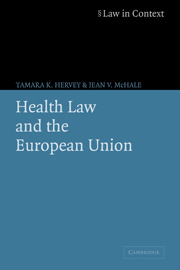Book contents
- Frontmatter
- Contents
- Acknowledgements
- Table of abbreviations
- Table of conventions and treaties
- Table of EU legislation
- Table of national provisions
- Table of cases
- Part One
- Part Two
- 4 Access to health care services
- 5 Data protection and health information privacy
- 6 Regulation of health care professionals
- 7 The regulation of clinical research
- 8 Regulating pharmaceuticals: risk, choice and compensation
- 9 Public health law
- Part Three
- Bibliography
- Index
5 - Data protection and health information privacy
Published online by Cambridge University Press: 10 December 2009
- Frontmatter
- Contents
- Acknowledgements
- Table of abbreviations
- Table of conventions and treaties
- Table of EU legislation
- Table of national provisions
- Table of cases
- Part One
- Part Two
- 4 Access to health care services
- 5 Data protection and health information privacy
- 6 Regulation of health care professionals
- 7 The regulation of clinical research
- 8 Regulating pharmaceuticals: risk, choice and compensation
- 9 Public health law
- Part Three
- Bibliography
- Index
Summary
Introduction
Health information privacy is one aspect of the right to privacy. Wacks regards the notion of “personal information” as essential to such a right. This he defines as being:
“those facts, communications or opinions which relate to the individual and which it would be reasonable for him to regard as intimate or sensitive and therefore to want to withhold or at least to restrict their collection, use and circulation.”
Much of the Anglo-American legal discourse concerning privacy in the common law tradition derives from a crucially influential article in the 1890 Harvard Law Review. The authors of this article, Warren and Brandeis, examined US case law and suggested that elements of this case law, such as defamation, copyright and breach of confidence, culminated in recognition of a right to privacy, which they regarded as being a “right to be left alone”. Health information is today commonly regarded as an important part of an individual's right to information privacy, and indeed information worthy of particular protection. Information privacy in the health context is integrally linked to the perceived inherent sensitivity of health information. In this chapter, we explore the effects of EU law on rights to privacy in health contexts, which include both health care and clinical research settings.
As we noted in chapter 1, there is no “European health law” in the sense of a harmonised set of health care or medical entitlements, applicable across the whole of the EU, determined by institutions at EU level, and indeed many elements of “health law” are not the subject of EU regulation.
- Type
- Chapter
- Information
- Health Law and the European Union , pp. 159 - 188Publisher: Cambridge University PressPrint publication year: 2004



